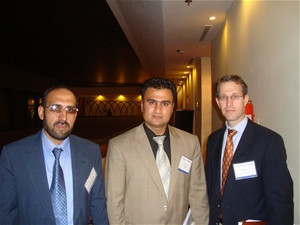
Two Afghan engineers, Sayed Torak (r), who works for USAID, and Ghulam Wali, of USAID’s Afghanistan Infrastructure Rehabilitation Program, are helping to establish the institutions that will oversee the revitalization of Afghanistan’s highway system.
USAID/AIRP
1 MARCH 2011 | KABUL, AFGHANISTAN
Progress brings complications. Every kilometer of road that is built or rehabilitated requires enormous coordination to fund, plan, and maintain. The old system of road maintenance—one which is fragmented among many ministries—is not able to keep up. Responsibility for the roads needs to be clear. To fix the problem, two of Afghanistan’s brightest engineers are overseeing the operations and maintenance of more than three thousand kilometers of Afghan highways. Sayed Torak is USAID’s Senior Engineer for Roads and Ghulam Wali is the Deputy Manager of USAID’s Roads’ Operation and Maintenance and Capacity Building project.
Fifteen years ago, when Torak and Wali graduated from Afghan universities with engineering degrees, they began their careers by working on small projects—building rural schools and clinics, constructing dusty provincial roads, and implementing sanitation projects. As they gained skill, Wali undertook site engineering for the Ring Road, Afghanistan’s Highway One. Torak worked with ministries to design roads that spurred rural development.
Torak and Wali have set about what is likely their most ambitious project. They are promoting the establishment of a public/private highway authority that can coordinate all of the complex activities necessary to sustaining Afghan roads. Accomplishing this goal will promote economic growth, reduce poverty, and facilitate sustained development in Afghanistan. The authority is modeled after successful institutions that have been established in other developing countries.
The $58 million project that Torak and Wali manage gives Afghans access to markets, medical facilities, and jobs from Kandahar to Fayzabad provinces.
The two engineers who started with small victories are now creating a superior highway system that will foster Afghan prosperity and development for generations to come. The future of Afghanistan’s road infrastructure is truly Afghan-led.







Comment
Make a general inquiry or suggest an improvement.